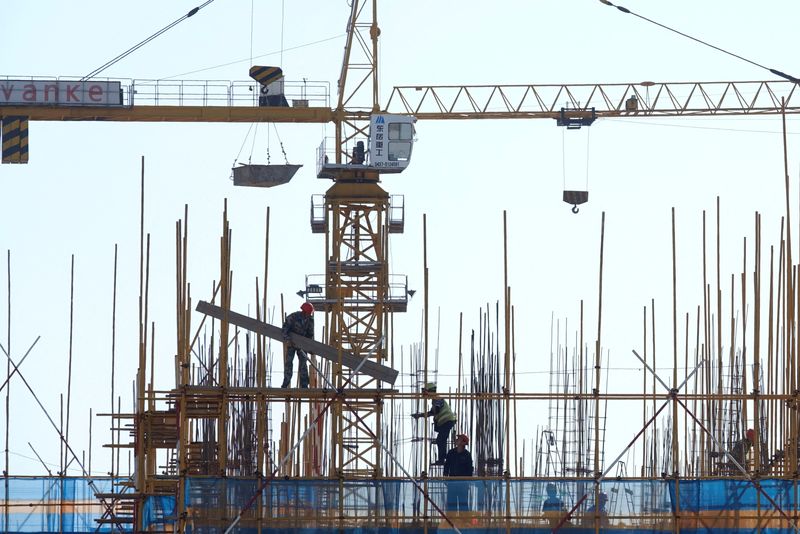Written by Claire Jim and Yu Xie
HONG KONG (Reuters) – Dollar bonds for China Vanke, the country's second-largest developer by revenue, fell on Tuesday after Moody's said it would consider giving the property company junk status, leading to a decline in the real estate sector. The predicament became even worse.
The company's 2025 notes were bid at around 68.5 cents to the dollar overnight, compared to 67.638 cents on the dollar in the morning, according to data from Duration Finance. The 2029 bond sold for 43.045 cents, down from 43.6 cents.
Vanke's Hong Kong-listed shares started the day down 1%, but strengthened to rise 1.4% as of 0229 GMT, while Shenzhen-listed shares fell 0.4%.
Moody's announced on Monday that it has canceled Vanke's Baa3 rating, the lowest of Moody's investment grade ratings, and assigned it a Corporate Family Rating (CFR) of Ba1. He also said that all of Mr. Vanke's ratings would be “considered for downgrade.”
Vanke is one of the few Chinese development companies with an investment grade rating. If other major rating agencies such as S&P and Fitch follow suit, Vanke's dollar-denominated bonds could be removed from some of the world's most important investment indexes.
“The company's current management and refinancing are normal and its financing channels are stable,” Vanke said in a statement to Reuters. He also said the impact of the downgrade on financial activities was “controllable.”
Authorities are racing to stabilize the real estate sector, which is in the throes of a debt crisis marked by defaults by the country's largest real estate companies, through support such as increased lending to developers of specific projects. There is.
Moody's move comes as China has asked banks to step up financing support for state-backed Vanke Bank and asked creditors to consider granting extensions to private debt maturities, Reuters reported earlier on Monday. The measures were taken in response to this.
Analysts say that if Vanke Bank's repayment problems occur, it could worsen the debt crisis and undermine market confidence.
“The market is still concerned about Vanke's long-term debt,” said Li Yuan, chairman of Beijing G Capital Private Fund Management Center LLP, which specializes in credit investments.
“The real pressure will start in the second half of this year. Without timely support from shareholders, Vanke will face liquidity depletion as home sales continue to slump.”
Vanke has about 14 billion yuan ($1.95 billion) worth of offshore bonds and about 20 billion yuan of onshore bonds that are due to mature or can be put by June 2025, according to the rating agency.
Moody's said in a statement that Vanke's financial flexibility and liquidity buffers are expected to weaken over the next 12 to 18 months due to lower contracted sales and increased uncertainty around financing.
The company's sales for the first two months of this year were down 40% compared to the same period last year, and are expected to decline 10% for the full year 2023.
In Hong Kong, the Hang Seng Mainland Property Index rose 2.6%, while China's CSI300 property index rose 0.3% in morning trading.
Stocks and bonds were under heavy selling pressure last week after reports that Vanke Bank was facing financial stress and asking some investors to extend debt maturities.
The company told Reuters on Friday that it had deposited the funds needed to repay a $630 million dollar bill due on Monday.
Vanke is government-backed and 33.4% owned by Shenzhen Metro, which is owned by the Shenzhen State Asset Regulatory Authority.
(1 dollar = 7.1769 Chinese Yuan)
(Reporting by Scott Murdoch in Sydney, Claire Jim, Donnie Kwok and Xie Yu in Hong Kong and Jason Xue in Shanghai; Editing by Christopher Cushing and Stephen Coates)


